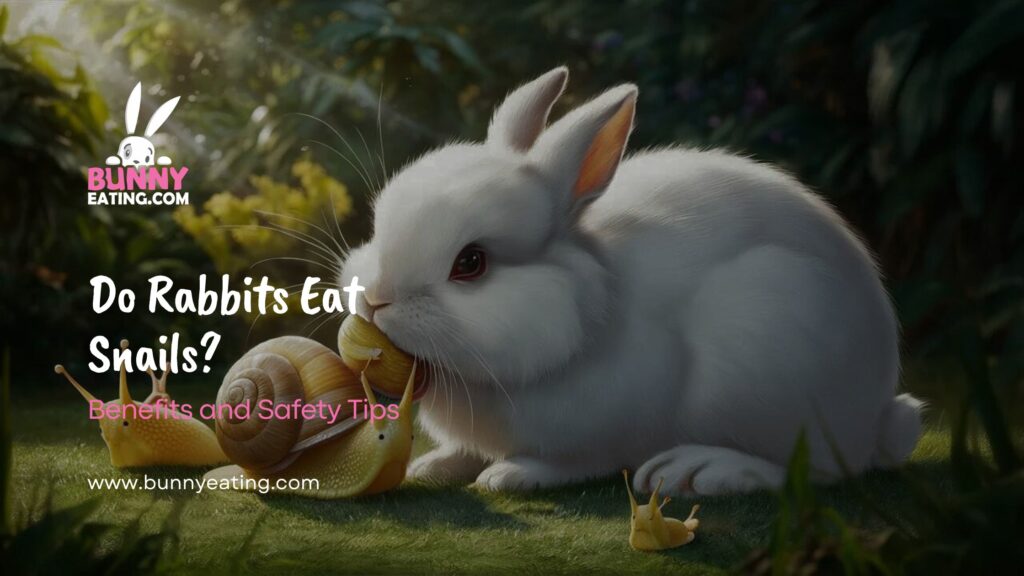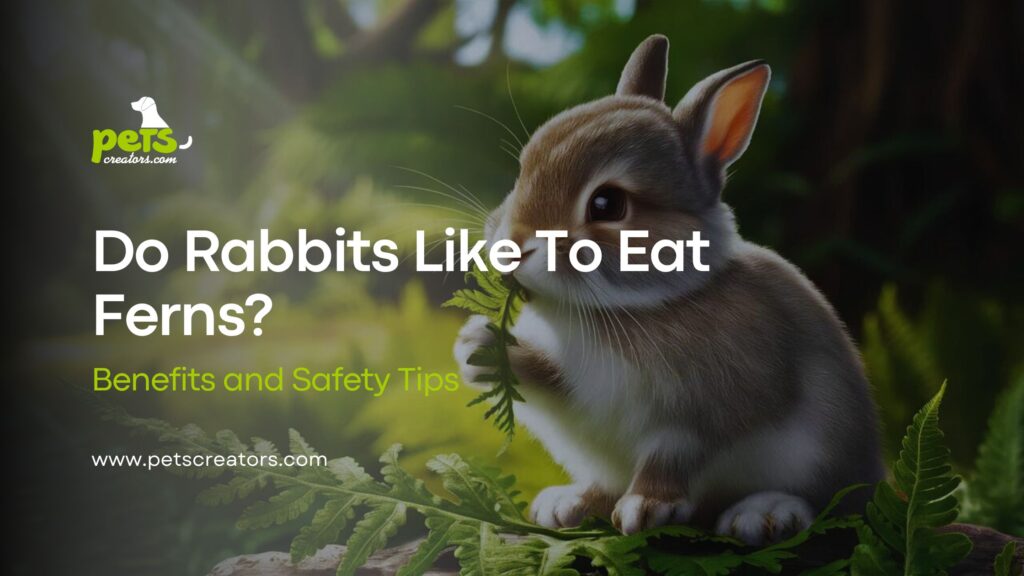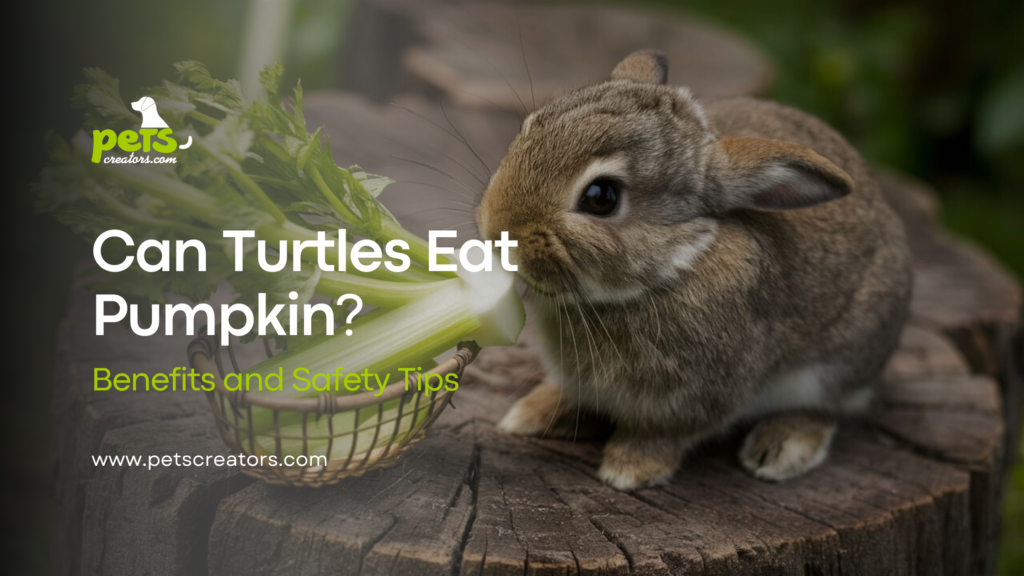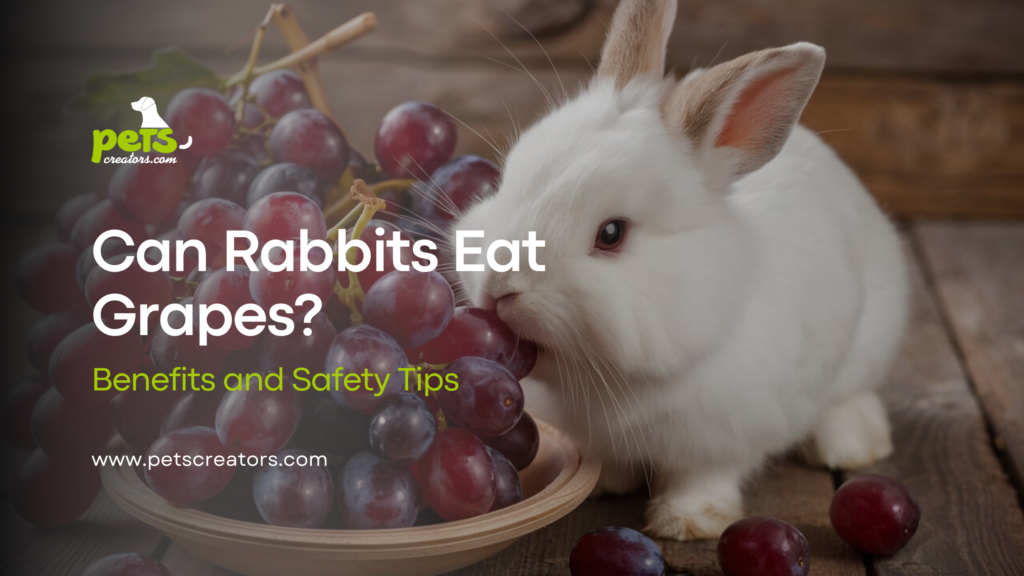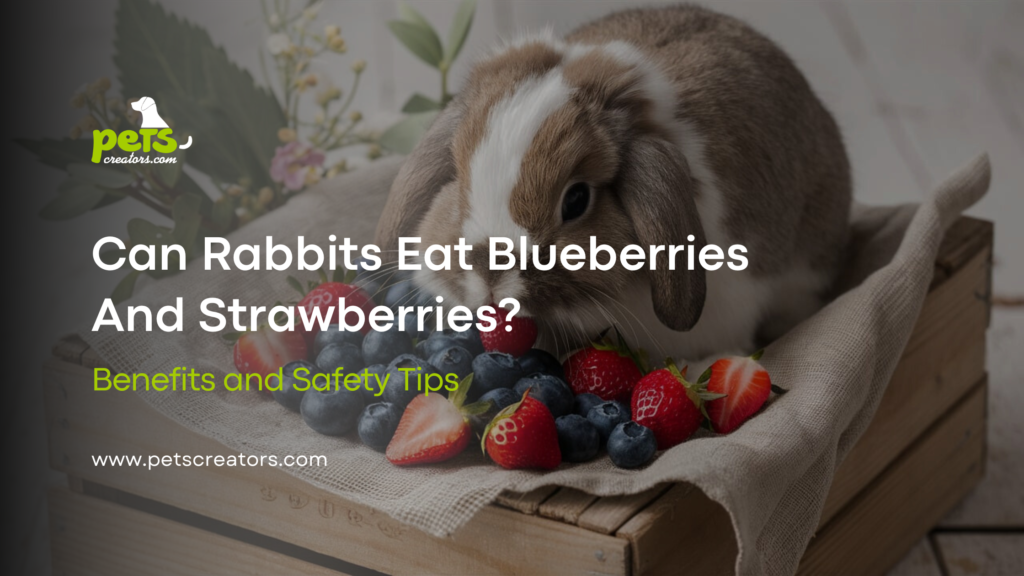Ever wondered if snails are a healthy snack for your furry friend? The answer is a resounding no! While it might seem like a harmless treat, snails can cause some serious health problems for rabbits. This article will delve into the reasons why snails are off the menu for bunnies, and explore some delicious and safe alternatives to keep your rabbit happy and healthy. Do Rabbits Eat Snails?
Safe Alternative to Rabbits Eat Snails?
Hold on! Snails are not part of a rabbit’s natural diet. Rabbits are herbivores, meaning their digestive system is built for processing plant material like hay, veggies, and fruits. Snails, on the other hand, are quite different. While they might seem like a harmless snack, they can cause some health problems for your bunny.
We’ll explore some safe and healthy alternatives to feeding your rabbit snails later 🙂
Risks of Feeding Snails to Rabbits
There are a couple of reasons why you shouldn’t feed snails to your rabbit.
-
Digestive issues: Rabbit tummies are very sensitive and need a specific balance of fibre and nutrients to function properly. Snails are high in protein and fat, which can disrupt this balance and lead to problems like gas, bloating, or even diarrhoea (let’s stick with calling it loose poo).
-
Parasites: Wild snails can carry parasites that can make your rabbit sick. Even if you get your hands on store-bought snails, there’s always a small chance they could be harbouring unwanted guests.
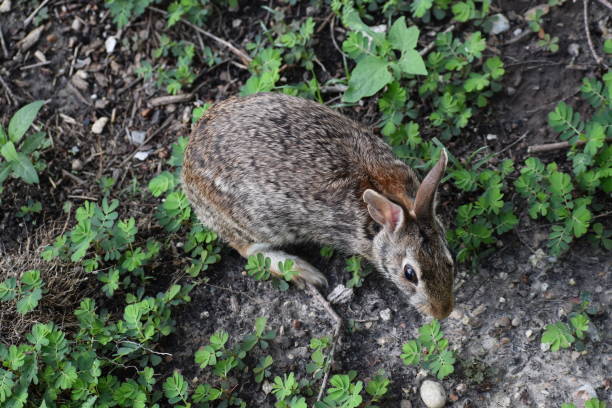
Effects of Snails on Rabbits
As mentioned earlier, snails can cause digestive upset in rabbits. Symptoms like loose poo, tummy aches, and lack of appetite are all signs that your rabbit might not be handling the snails well. In severe cases, it could even lead to a more serious condition called GI stasis, which means the gut stops moving food through properly.
Are Snails Good for Rabbits?
Short answer: No, snails are not good for rabbits. Their digestive system just isn’t designed for them, and the risks outweigh any potential benefits.
Nutritional Value of Snails for Rabbits
Snails do contain some protein and calcium, which are important nutrients for rabbits. However, they’re not a good source of these nutrients for bunnies. A balanced diet of hay, veggies, and fruits will provide all the protein and calcium your rabbit needs safely and healthily.
How is Eat Snails Made
There isn’t a common rabbit food product called “Eat Snails.” It’s likely a misunderstanding, perhaps with commercially prepared rabbit food that contains something that sounds similar, like dehydrated vegetables or pellets.
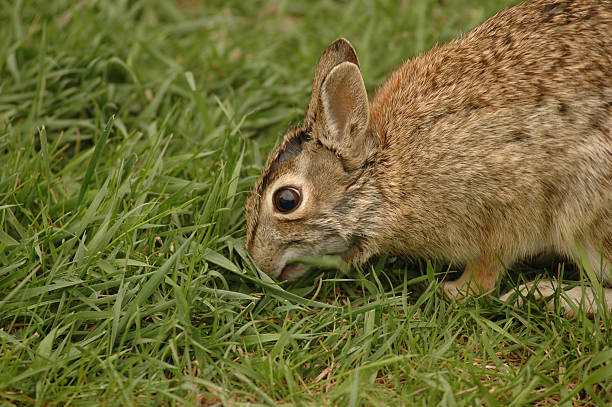
What Types of Snails Are Safe for Rabbits?
Even though there isn’t a special type of snail safe for rabbits, it’s best to avoid them altogether. A rabbit’s diet should focus on hay, fresh veggies, and a small amount of fruit. These foods provide all the nutrients your bunny needs to stay happy and healthy.
Do Wild Rabbits Eat Snails?
While a wild rabbit might munch on a stray snail in the garden, snails wouldn’t be a regular part of their diet. Wild rabbits instinctively know what foods are best for them, and snails just aren’t on the menu.
Why is Eating Snails Harmful to Rabbits?
We’ve covered this a bit already, but to recap: Snails are high in protein and fat, which can disrupt a rabbit’s sensitive digestive system. They can also carry parasites that can make your bunny sick.
Store-bought Snails and Rabbit
Even if you find pre-packaged snails at the pet store, they aren’t suitable for rabbits. These are typically meant for other pets, like turtles or fish, and don’t meet the nutritional needs of a rabbit.
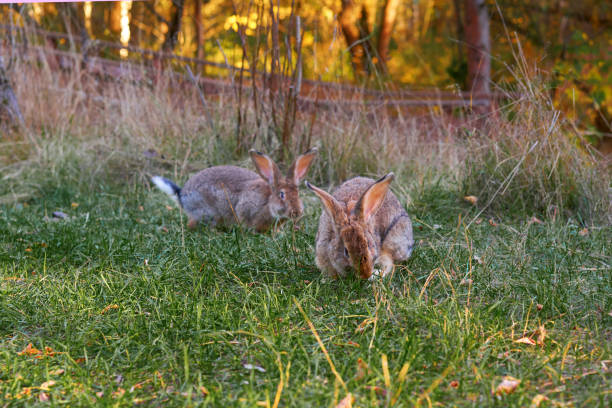
How Often Can My Rabbit Eat Snails?
The safest answer is never. Rabbits don’t need snails in their diet, and the risks are just too high. Stick with a diet of hay, veggies, and a bit of fruit for a happy and healthy bunny.
How Many Snails Are There? (How Much is Too Much?)
This question is a little like asking how many blades of grass are in your yard! There’s no set number because snails shouldn’t be part of a rabbit’s diet at all.
What About Snails Seeds and Leaves?
This might be another case of mistaken identity! There are no plants that are known as snail seeds or snail leaves. Rabbits are instinctive grazers, and they will occasionally nibble on plants and seeds that they come across in the wild. If there is a particular plant in your yard that is suspicious, it is wiser to use the internet and search whether rabbits are safe around the plant or not. One can easily come across numerous websites with lists of plants that are safe for rabbits and those that are toxic to them.
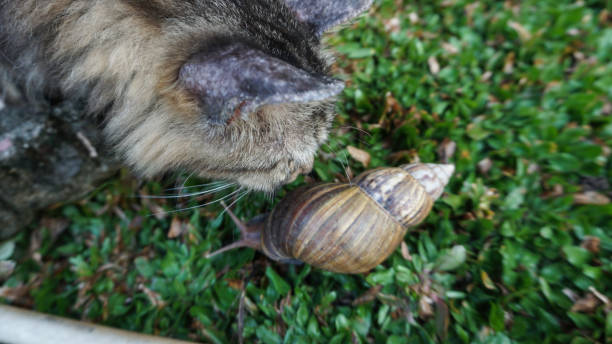
Tips for Serving Snails to Bunnies? (What to Feed Your Rabbit Instead)
As we’ve established, snails are a no-go for bunnies. But don’t worry, there are plenty of delicious and healthy alternatives your rabbit will love! Here are some ideas:
- Hay: This should be the foundation of your rabbit’s diet. It provides essential fibre for their digestive system and helps keep their teeth worn down. Aim for unlimited access to high-quality hay.
- Fresh Vegetables: Offer a variety of colourful veggies daily. Great choices include leafy greens like romaine lettuce, kale, and dandelion greens, as well as bell peppers, carrots (with the greens!), and green beans.
- Fruit: Fruit should be a smaller part of your rabbit’s diet due to its higher sugar content. A few slices of apple, banana, or berries a couple of times a week are plenty.
How Does Snail Digestion Work in Rabbits?
A rabbit’s digestive system is built for processing plant material. Their gut relies on a constant flow of fibre to keep things moving smoothly. Snails, being high in protein and fat, can disrupt this delicate balance. The protein can be difficult for rabbits to digest, leading to gas and bloating. The fat content can slow down the digestive process, which can cause serious problems like GI stasis.
Nutritional Benefits of Eating Snails for Rabbits? (Why Not Snails?)
Snails do contain some protein and calcium, but these nutrients are found in much higher quantities and more readily available forms in rabbit-approved foods. Hay is an excellent source of fiber and essential vitamins, while leafy greens and vegetables provide a good dose of vitamins, minerals, and hydration.
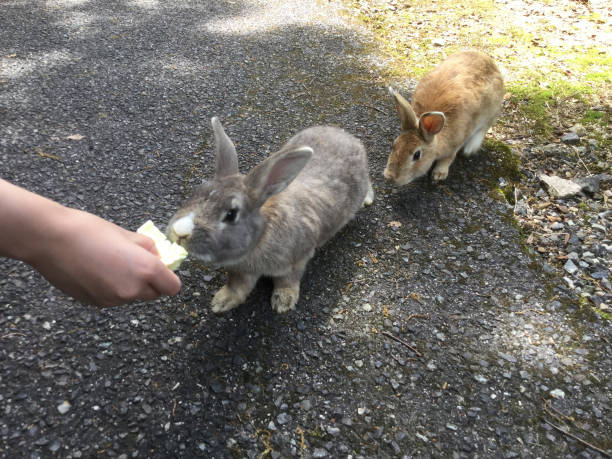
Do Rabbits Enjoy Snails Food? (What Rabbits Like to Eat)
Rabbits are herbivores by nature, so they’re naturally drawn to plant-based foods. They have taste receptors specifically designed to enjoy the flavours and textures of hay, veggies, and fruits. Snails, on the other hand, wouldn’t be on their list of culinary delights.
What Parts of Snails Can Rabbits Eat?
Again, it’s best to avoid snails altogether. There’s no safe part of a snail for a rabbit to consume.
Can Rabbits Eat Snail Seeds? (Safe Plants for Rabbits)
As mentioned before, there aren’t any plants called “snail seeds.” If you’re unsure about a particular plant in your yard, consult a reliable online resource or ask your veterinarian for guidance. There are many safe and delicious plants your rabbit can enjoy, so stick with those!
Can Snails Be Toxic to Rabbits?
Snails themselves aren’t inherently toxic to rabbits, but the parasites they might carry can be. Wild snails can harbour internal parasites that can make your rabbit sick. Even disinfected store-bought snails might carry a small risk.
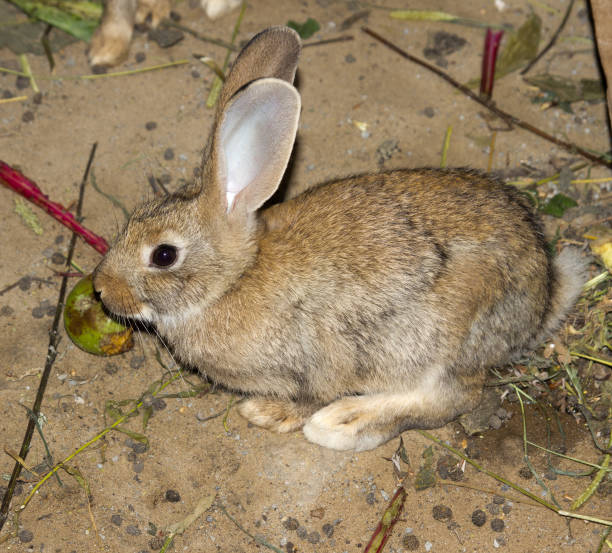
Can Snails Cause Digestive Problems in Rabbits?
Absolutely! As we’ve discussed, a rabbit’s digestive system isn’t equipped to handle the protein and fat content of snails. This can lead to a range of digestive problems, including gas, bloating, diarrhoea, and even GI stasis, a potentially life-threatening condition.
How Do You Introduce Your Bunny to Snails?
There’s no safe way to introduce your rabbit to snails. Their digestive system simply can’t handle them. Focus on providing your bunny with a balanced diet of hay, fresh veggies, and a touch of fruit. These foods will keep your rabbit happy, healthy, and full of pep!
Preparing Snails for Rabbits? (What to Do Instead)
Since snails are a no-no for rabbits, there’s no need to prepare them in any special way. Instead, let’s focus on how to prepare some delicious and nutritious rabbit-approved meals!
-
Hay Heaven: Make sure your rabbit has unlimited access to high-quality hay. Aim for a variety of textures, like meadow hay and orchard grass. You can even get creative and stuff hay into cardboard boxes or paper towel rolls for foraging fun.
-
Veggie Variety: Wash and chop up a selection of fresh vegetables daily. Rotate the offerings to keep things interesting for your bunny. Here’s a handy tip: Wash your veggies and store them pre-chopped in an airtight container in the fridge for easy meal prep.
-
Fruit Fun: Remember, fruits are a treat, not a staple. A couple of tablespoons of chopped apple, banana, or berries a few times a week are enough. Avoid processed fruits, dried fruit, and anything with added sugar.
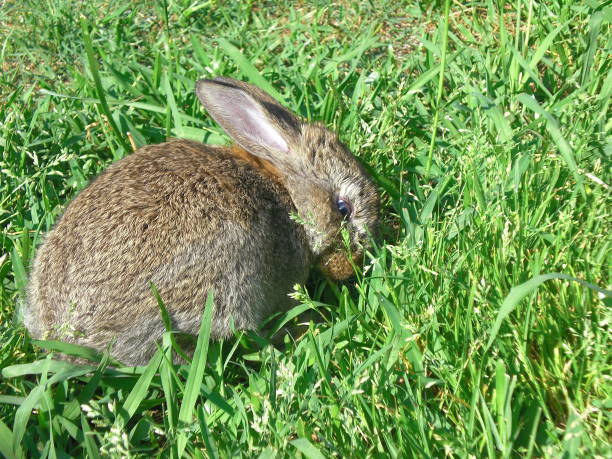
How Do Rabbits Eat Snails?
Rabbits are grazers by nature: in the wild – they feed this way. They spend more hours grazing on grasses, weeds as well as leaves and stems of other plants. Their teeth grow continuously and having to chew constantly ensures that they do not grow out of shape and length. Carrion beetles might be out of reach for a wild rabbit, but domestic rabbits require the same food.
What If My Rabbit Eats a Large Number of Snails?
If you know your rabbit has eaten a significant amount of snails, err on the side of caution and consult your veterinarian immediately. They can advise on the best course of action to monitor your rabbit’s health and avoid any potential problems.
How Much Snails Can My Rabbit Have?
The safest answer is zero. Rabbits don’t need snails in their diet, and the risks far outweigh any potential benefits. Focus on a balanced diet of hay, veggies, and a small amount of fruit to keep your furry friend happy and thriving.
When Shouldn’t You Feed Snails to Your Rabbit? (Always!)
Snails are never a good idea for rabbits. Their digestive system just isn’t designed for them, and there’s no scenario where the benefits outweigh the risks.
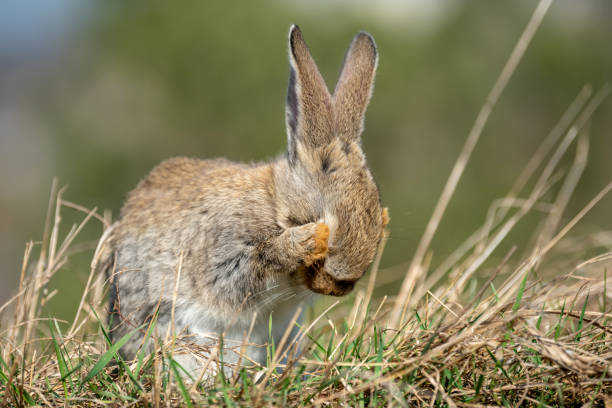
Can Baby Rabbits Eat Snails? (Same Rules Apply to Kits)
Baby rabbits, also called kits, have even more sensitive digestive systems than adults. They should never be given snails or any other food that isn’t specifically formulated for rabbits. A diet of high-quality hay and special pellets designed for young rabbits will provide them with all the nutrients they need to grow strong and healthy.
How Frequently Should Adult and Baby Rabbits Be Fed Snails? (Zero Times a Day)
Just like adult rabbits, baby bunnies shouldn’t be fed snails at any frequency. Their diet should focus on hay and age-appropriate pellets, with a small introduction of fresh veggies as they get older.
Potential Dangers in Snails? (We’ve Covered This, But Here’s a Recap)
The potential dangers in snails for rabbits include:
- Digestive upset: Snails are high in protein and fat, which can disrupt a rabbit’s delicate digestive system.
- Parasites: Wild snails can carry parasites that can make your rabbit sick.
- Nutritional Imbalance: Snails don’t provide the essential nutrients that rabbits need from their diet.
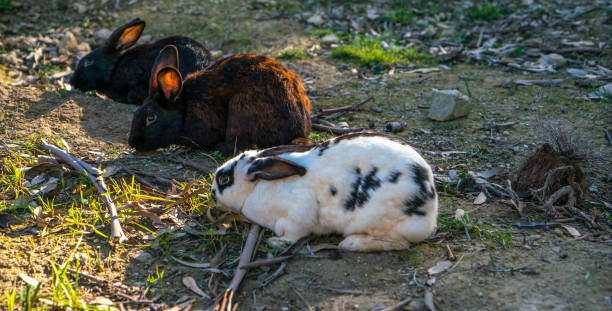
What if My Rabbit Accidentally Eats a Lot of Snails? (Monitor and Call Your Vet)
If you discover your rabbit has gotten into a stash of snails, the most important thing is to stay calm and monitor them closely. Watch for signs of digestive upset like loose poo or lack of appetite. If you notice any concerning symptoms, contact your veterinarian right away.
Incorporating Fresh Greens and Vegetables (Alternatives to Snails)
Since we now know snails are off the menu, let’s explore some fantastic alternatives! Fresh vegetables and greens are a vital part of a rabbit’s diet, providing essential vitamins, minerals, and hydration. Here are some tips:
-
Variety is Key: Offer a rainbow of colours! Dark leafy greens like romaine lettuce, kale, and collard greens are packed with nutrients. Mix things up with other veggies like bell peppers, carrots (with the greens!), green beans, and broccoli florets.
-
Start Slow: If your rabbit isn’t used to a lot of fresh produce, introduce new veggies gradually. This helps their digestive system adjust and prevents any tummy troubles.
-
Wash Thoroughly: Always wash vegetables before feeding them to your rabbit. Remove any wilted or spoiled parts.
-
Chop It Up: Cut veggies into bite-sized pieces to prevent choking hazards.
Creating a Balanced Diet With Snails (Sticking to Rabbit-Safe Foods)
Forget the snails! Let’s focus on creating a balanced diet that keeps your bunny happy and healthy. Here’s the winning formula:
-
Unlimited Hay: This should be the cornerstone of your rabbit’s diet. Hay provides essential fibre for their digestive system and helps keep their teeth worn down. Choose high-quality hay like meadow hay or orchard grass.
-
Fresh Veggies Daily: Aim for around 2-3 cups of chopped vegetables per day for an adult rabbit. Rotate the offerings to keep things interesting and provide a variety of nutrients.
-
Fruit in Moderation: Fruits are higher in sugar, so limit them to a small treat. A tablespoon or two of chopped apple, banana, or berries a few times a week is plenty.
Remember: Snails don’t fit into this healthy equation. Stick with rabbit-approved foods to keep your furry friend thriving.
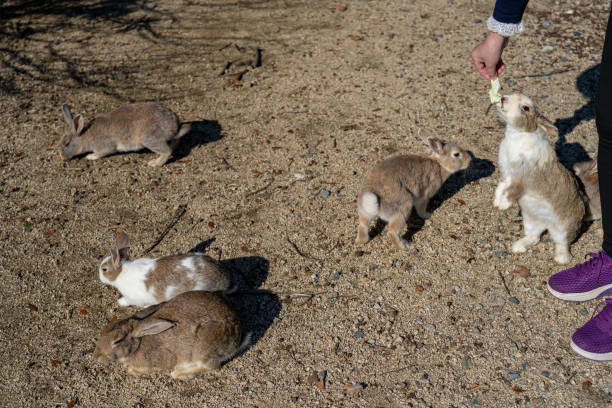
My Rabbit Ate a Whole Snail (Observing Your Rabbit)
If your rabbit manages to snag a whole snail, don’t despair. The most important thing is to monitor them closely for the next day or two. Here’s what to watch for:
- Digestive Discomfort: Signs like loose poo, gas, or bloating could indicate some digestive upset.
- Loss of Appetite: If your rabbit isn’t interested in their usual hay or veggies, it could be a cause for concern.
- Lethargy: A rabbit that seems unusually lethargic or sits hunched over with a tense belly might need veterinary attention.
If you notice any of these signs, err on the side of caution and contact your veterinarian. Early intervention can help prevent more serious problems.
Can Rabbits Eat Wild Snails?
The answer remains the same – no. Wild snails pose the same risks as store-bought snails. They can be high in protein and fat, carry parasites, and disrupt your rabbit’s delicate digestive system.
What Else Can I Feed My Rabbit Besides Snails?
There’s a whole world of delicious and nutritious foods your rabbit can enjoy besides snails! Here are some ideas:
- Herbs: Fresh herbs like basil, mint, parsley, and cilantro can be a healthy treat in small quantities.
- Rabbit Pellets: Choose high-quality pellets formulated specifically for rabbits. These provide essential nutrients that hay and veggies alone might not.
- Safe Flowers: Occasional edible flowers like hibiscus or rose petals can be a fun and festive treat. Always research a flower thoroughly before offering it to your rabbit.
Remember, a balanced diet is key to a happy and healthy rabbit. Focus on hay, fresh veggies, a small amount of fruit, and occasional rabbit-approved treats.
How to Create a Rabbit-Friendly Garden?
Since snails are out of the picture, why not create a safe and fun space for your rabbit to explore and nibble on some delicious greenery? Here’s how to design a rabbit-friendly garden:
-
Think Safety First: Rabbits are escape artists! Ensure your garden has secure fencing that goes at least a foot underground to prevent them from digging out. Chicken wire or hardware cloth are popular choices for rabbit fencing.
-
Separate the Delicious from the Destructive: Dedicate a specific area of your garden for your rabbit’s playground. Plant safe and healthy veggies, herbs, and flowers within this section. Use fencing or wire mesh to separate this area from the rest of your garden where you might have plants that are toxic to rabbits.
-
Bunny-Approved Plants: Fill your rabbit’s garden with delicious and nutritious options. Here are some favourites.
-
Leafy Greens: Kale, Swiss chard, romaine lettuce, dandelion greens (avoid using weed killers on your dandelions!)
-
Herbs: Basil, mint, parsley, cilantro (in moderation)
-
Veggies: Bell peppers, carrots (including the leafy tops!), green beans, broccoli florets (avoid the stalks)
-
-
Climbing Companions: Let your rabbit’s playground go vertical! Plant climbing vegetables like peas or beans on trellises or fences. This provides enrichment and extra nibbling opportunities.
-
Shady Spots and Hiding Places: Rabbits need protection from the hot sun and places to feel safe. Include shade structures, small tunnels, or hiding boxes in their garden area.
-
Keep it Clean: Regularly remove any uneaten vegetables, droppings, or debris from your rabbit’s garden area to maintain good hygiene.
Snails Feeding Guidelines and Amounts
There are no feeding guidelines or amounts for snails because they are simply not a part of a healthy rabbit diet. Remember, rabbits are herbivores, and their digestive system thrives on fibre-rich plant material. Stick with the delicious and safe options mentioned in the previous section.
Rabbit Treats Made at Home with Snails
We know snails are a no-go, but that doesn’t mean your rabbit can’t enjoy yummy treats! Here are some fun and healthy homemade options:
-
Oatmeal Surprise: Cook a small amount of plain oatmeal (no added sugar or flavouring). Once cool, mash it up and mix in a few chopped dried cranberries or blueberries.
-
Apple Chips: Thinly slice an apple (avoid the core) and bake them at low heat until dehydrated and crispy. These make a healthy and crunchy snack.
-
Hay Popsicles: This is a fun and refreshing treat for hot summer days! Steep some rabbit-safe herbs like mint or chamomile in hot water. Let it cool, then pour it into ice cube trays with a few sticks of hay in each section. Freeze completely before offering it to your rabbit.
There are many other creative and healthy treat ideas online and in cookbooks specifically for rabbits. Get creative and have fun!
Conclusion
In conclusion, although coming across a snake in a garden with its tender grass is quite fascinating, these creatures can pose a threat to a rabbit’s stomach. To ensure your rabbit is in good health and full of energy, feed it hay and fresh vegetables; occasional treats are also allowed. Avoid the snails and discover the plethora of tasty and healthy rabbit foods to incorporate into your pet’s diet while also providing your rabbit with a stimulating environment for him to live comfortably!
FAQs – Snails and Rabbits
Q Can rabbits eat snails?
A: No, rabbits shouldn’t eat snails. They can disrupt their digestion and potentially carry parasites.
Q What if my rabbit ate a snail?
A: Monitor them for digestive upset like loose poo or lack of appetite. If concerned, contact your vet.
Q Are there any safe alternatives to snails for rabbits?
A: Yes! Plenty of delicious and healthy options exist like fresh veggies, rabbit pellets, and some herbs.
Q Can rabbits eat wild snails?
A: No, wild snails pose the same risks as store-bought ones.
Q What can I plant in a rabbit-friendly garden?
A: Leafy greens, herbs like parsley, and veggies like bell peppers are great choices.
Q Are there any treats I can make for my rabbit?
A: Yes! Oatmeal surprises, apple chips, and hay popsicles are fun and healthy options.

